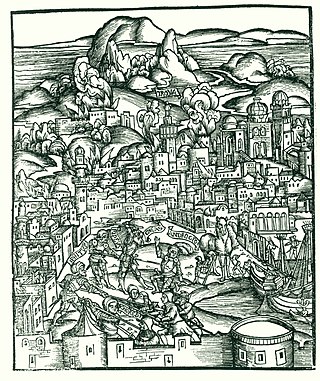This article relies largely or entirely on a single source .(May 2021) |
In Greek mythology, Demoleus or Demoleos was an Achaean warrior who participated in the Trojan War.
This article relies largely or entirely on a single source .(May 2021) |
In Greek mythology, Demoleus or Demoleos was an Achaean warrior who participated in the Trojan War.
During the siege of Troy, Demoleus was slain by the hero Aeneas. [1]
Aeneas gave a smooth-linked golden corselet, triple-chained, of which his own victorious hand despoiled Demoleos, by the swift, embattled stream of Simois, under Troy,—and bade it be a glory and defence on valor's field; scarce might the straining shoulders of two slaves, Phegeus and Sagaris, the load endure, yet oft Demoleos in this armor dressed charged down full speed on routed hosts of Troy. [2]
In Greek mythology, Phegeus was the name of the following characters:

In the Aeneid of Virgil, Achaemenides was a son of Adamastos of Ithaca, and one of Ulysses's crew. He was marooned on Sicily when Ulysses fled the Cyclops Polyphemus, until Aeneas arrived and took him to Italy with his company of refugee Trojans.
In Greek mythology, Coroebus may refer to two distinct characters:
In Greek mythology, Deiphobus was a son of Priam and Hecuba. He was a prince of Troy, and the greatest of Priam's sons after Hector and Paris. Deiphobus killed four men of fame in the Trojan War.
In Greek mythology, the name Emathion refers to four individuals.
In Greek mythology, the name Halaesus or Halesus may refer to:
There are several characters named Acmon or Akmon in Greek mythology:
In Roman mythology, the Aeneads were the friends, family and companions of Aeneas, with whom they fled from Troy after the Trojan War. Aenides was another patronymic from Aeneas, which is applied by Gaius Valerius Flaccus to the inhabitants of Cyzicus, whose town was believed to have been founded by Cyzicus, the son of Aeneas and Aenete. Similarly, Aeneades was a patronymic from Aeneas, and applied as a surname to those who were believed to have been descended from him, such as Ascanius, Augustus, and the Romans in general.
In Roman mythology, Sergestus was a Trojan friend of Aeneas. He was the ancestor of gens Sergia, a famous Patrician family of which Catilina was a member. Hence he is also the ultimate namesake of the given names Sergey, Sergio, etc.
In Greek mythology, Ilus is the name of several mythological persons associated directly or indirectly with Troy.
In Greek mythology, Asius refers to two people who fought during the Trojan War:
Mimas was a Greek mythological character who appears in Virgil's Aeneid. He was the son of Amycus and Theano. A noble Trojan, he accompanied Aeneas to Italy, where he was killed by Mezentius.
In Greek mythology, the name Ilioneus may refer to:
In Greek mythology, Thalia or Thaleia was one of the fifty Nereids, marine-nymph daughters of the 'Old Man of the Sea' Nereus and the Oceanid Doris. Her name was derived from θάλλειν thállein which means "to flourish, to be green".

In Greek mythology, Creusa was the daughter of Priam and Hecuba. She was the first wife of Aeneas and mother to Ascanius.

In Virgil's Aeneid, Androgeos or Androgeus was a Greek soldier, who during the sack of Troy in the middle of the night mistook Aeneas and his group of Trojan defenders for a Greek raiding party, paying for this mistake with his life. Afterwards, Aeneas's companion Coroebus dressed in Androgeos's armor in order to fool more Greek soldiers to their demise, only to be the first among Aeneas's disguised group to die.
In Greek mythology, Dryops
In Greek mythology, Spio was one of the 50 Nereids, marine-nymph daughters of the 'Old Man of the Sea' Nereus and the Oceanid Doris. Variations of her name were Speio and Speo.
In Greek mythology, Noëmon may refer to the following characters:
In Greek mythology, Alcander or Alcandrus (Ancient Greek: Ἄλκανδρος may refer to the following characters: